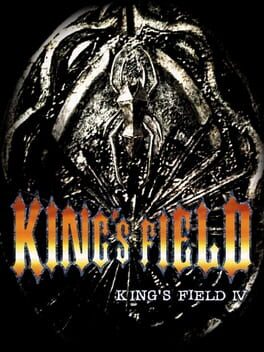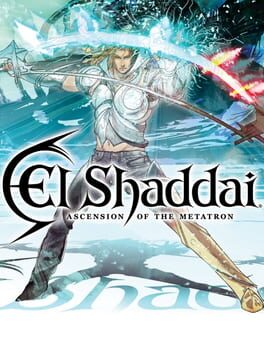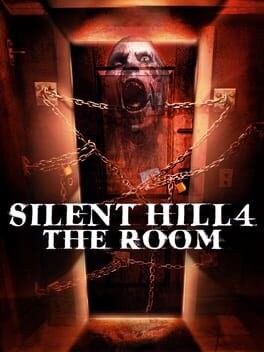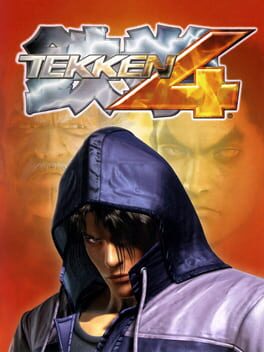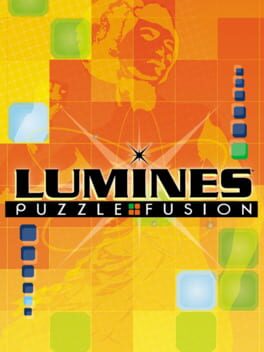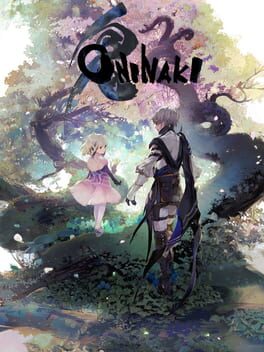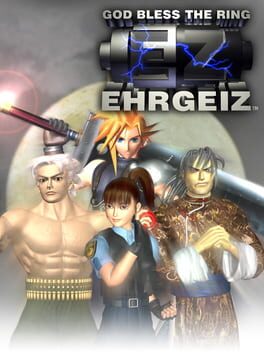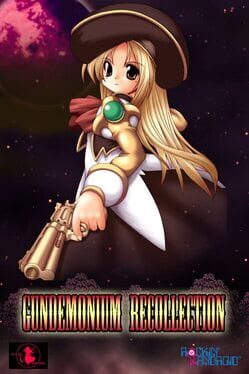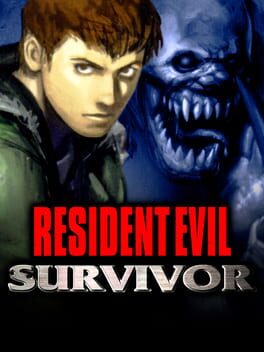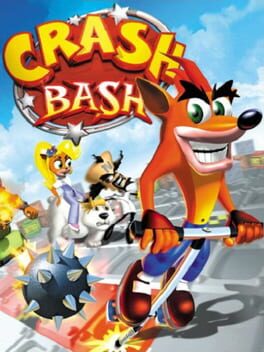tenn
57 reviews liked by tenn
King’s Field IV es asomarse a un agujero, intuir una luz al fondo, unos ojos rojos que te miran desde la oscuridad y decidir dar el paso a lo desconocido.
Versión larga: https://yosoyira.medium.com/la-ciudad-olvidad-aca01b22c40
Versión larga: https://yosoyira.medium.com/la-ciudad-olvidad-aca01b22c40
comfy doom and gloom. while its early parts feel small and a little oppressive, i still find it really easy to get into the tempo of king's field 4 and its slow-dance combat. and this one's even sludgier than the first 3 — which, if anything, might be attributed to the dreamlike, harpsichord-laden, sometimes even giallo-esque atmosphere i tend to associate with fromsoft's unique dungeon crawling action rpgs preceding demon's souls. of course, metaphysical dark fantasy mythopoeia remains the soul (forgive me) of their work, but king's field 4 distinguishes itself. being a game with some gnarly ps2 interlacing didn't hurt, if you ask me. if you can get used to the controls, this game is frankly quite refreshingly low-key (and i enjoy revisiting it).
taking inspiration from something "biblical" (book of enoch technically isnt in most judeo-christian canons apparently) may inherently give it a ~serious art~ air, but this game is so sly and playful with it in really fun ways, and never to the point of sacrilege. like lucifel/r is an all black tits-out-in-a-v-neck baddie who relays your progress to god on his cell and at one point implies how long it takes to beat the game and it just works. there's a bit of capcom/clover sense of style at play here, there's a character designer from dmc1 and okami having the same role on AND directing this after all, but i think its smarter about how it employs those sensibilities than any of those games. the protagonist wearing nothing but designer jeans for example has so much to it besides just getting silly w it; a modern signifier as part of an update on an ancient tale, something befitting of a story of angels who see all of time all at once, and genuine veneration of the male form.
el shaddai feels truly mythic too in ways that a lot of mythological fiction in games doesn't, not just for the level of its visual splendor but pretty much because of how cryptic and temporally mixed up its story is. what exactly happens doesn't matter as much as it means to make us feel like we are looking into a series of events greater than our logic can dictate to us--maybe to a fault for making us too distanced from what goes on, but i think its still effective in how novel it all is. also the action and platforming parts are functional n fine but obviously in service to showing itself off, and that's ok. really enjoyed this and feel like not enough credit is given to the smirk it wears so so confidently.
el shaddai feels truly mythic too in ways that a lot of mythological fiction in games doesn't, not just for the level of its visual splendor but pretty much because of how cryptic and temporally mixed up its story is. what exactly happens doesn't matter as much as it means to make us feel like we are looking into a series of events greater than our logic can dictate to us--maybe to a fault for making us too distanced from what goes on, but i think its still effective in how novel it all is. also the action and platforming parts are functional n fine but obviously in service to showing itself off, and that's ok. really enjoyed this and feel like not enough credit is given to the smirk it wears so so confidently.
Some enemies create a subconscious space to draw you into. If you suddenly feel faint, be on the alert. It's a sign your soul is under attack. Of course enemies that materialize before you are nothing but phantoms, but the suffering their attacks inflict on your body is real. You must [defeat them all to regain consciousness. ]
Lemme tell you a tale of Lucifer as a Wrangler-jeaned anime shojo with a Save Game flip-phone flipping around doing Devil May Cry (but God Certainly Will) combos that yield Christian frame advantage upon angels and demons from the Abrahamic pseudepigraphy. Exploiting movement tech to wavedash through portraits of the Archangel Gabriel built beautifully with 720p of the Lord's tears; stunlocking key figures from Aramaic and Ethiopian Orthodox Tewahedo scripture until they drop upgrade points: speedrunning an assault on the Kingdom of Heaven, a tower where the Authority and Metatron reign.
You can beat it in 7 hours... if you're good enough.
Lemme tell you a tale of Lucifer as a Wrangler-jeaned anime shojo with a Save Game flip-phone flipping around doing Devil May Cry (but God Certainly Will) combos that yield Christian frame advantage upon angels and demons from the Abrahamic pseudepigraphy. Exploiting movement tech to wavedash through portraits of the Archangel Gabriel built beautifully with 720p of the Lord's tears; stunlocking key figures from Aramaic and Ethiopian Orthodox Tewahedo scripture until they drop upgrade points: speedrunning an assault on the Kingdom of Heaven, a tower where the Authority and Metatron reign.
You can beat it in 7 hours... if you're good enough.
you will believe an undead serial killer thinks an apartment is his mom!
not really an unfairly maligned or forgotten masterpiece, but probably something more interesting than that, a brilliant and marred text. fully convinced this is one of the smartest games about our responsibilities to each other as people, and how that ties into the nature of urban living where caring about others seems to entail some element of seedy voyeurism and you are faced with the immediate proximity of violence that you are powerless to stop and yet somehow obligated to ameliorate (yet less convinced that the fine-tuning and balance issues that make this a little more abrasive than it had to be wouldn't have benefited from, y'know, not being developed while they were also developing sh3). don't get me wrong, most of the time it's being abrasive for a reason, and, more importantly, for a precise, expressive reason: giving you the womblike comfort of your healing apartment only to strip it away and fill it with inexplicable, damaging horrors (walter's childhood redux, wisdom received), forcing you to backtrack through the settings of your past failure to protect others as their vengeful ghosts try to prevent you from protecting the only one you can save, the deliberately gross and goofy sound design which speaks to the inassimilable strangeness of, for the first time in the series, exploring the oneiric recesses of a psychology wholly unrelated to yours. it's not really -cool- and it's not really scary, it's sad and disgusting and frustrating above all, but it builds confidently off the previous games in fleshing out what we owe kids, as a society around them, and how we displace our pain and fear and anger and need for control onto them. the final boss dies wrapped in umbilical cord and impaled with fragments of his mother, made human again in the inextricable frailty of his lifelong search for a maternal figure in an abusive lie. it's a great sendoff to the series even if what comes before it feels gratingly half-baked at times. rip team silent rip to the REAL silent hill 5 please take a moment to pour one out for the greatest to ever do it
not really an unfairly maligned or forgotten masterpiece, but probably something more interesting than that, a brilliant and marred text. fully convinced this is one of the smartest games about our responsibilities to each other as people, and how that ties into the nature of urban living where caring about others seems to entail some element of seedy voyeurism and you are faced with the immediate proximity of violence that you are powerless to stop and yet somehow obligated to ameliorate (yet less convinced that the fine-tuning and balance issues that make this a little more abrasive than it had to be wouldn't have benefited from, y'know, not being developed while they were also developing sh3). don't get me wrong, most of the time it's being abrasive for a reason, and, more importantly, for a precise, expressive reason: giving you the womblike comfort of your healing apartment only to strip it away and fill it with inexplicable, damaging horrors (walter's childhood redux, wisdom received), forcing you to backtrack through the settings of your past failure to protect others as their vengeful ghosts try to prevent you from protecting the only one you can save, the deliberately gross and goofy sound design which speaks to the inassimilable strangeness of, for the first time in the series, exploring the oneiric recesses of a psychology wholly unrelated to yours. it's not really -cool- and it's not really scary, it's sad and disgusting and frustrating above all, but it builds confidently off the previous games in fleshing out what we owe kids, as a society around them, and how we displace our pain and fear and anger and need for control onto them. the final boss dies wrapped in umbilical cord and impaled with fragments of his mother, made human again in the inextricable frailty of his lifelong search for a maternal figure in an abusive lie. it's a great sendoff to the series even if what comes before it feels gratingly half-baked at times. rip team silent rip to the REAL silent hill 5 please take a moment to pour one out for the greatest to ever do it
Tekken 4
2001
Competitive game aside, this is one of the best representations of martial arts in videogames.
Context and fidelity packaged in the own diegesis.
Diving into it through the ps2 bios
Asphalt and Mist.
Parkings and malls.
Beach, jails , skycrapers.
The new world of technology and globalization.
The setting is the frame of the beginning of the century in Fighting, in which traditional martial arts spread throughout the world and are reconfigured in sports and exercise. contexts coexist with new fighting systems designed for combat itself.
Jin Kazama abandoning his homeland, family and his karate style based on tradition and roots for the Kyokushinkai Karate, more pragmatic and brutal . Learning it in Brisbane (which is famous for the practice of Kyokushinkai), out of its cradle, suggests the expansion of martial arts to various levels that the arrival of a new millennium implies.
in tradition, continuing with the respectful, almost mystical reverential treatment that they once had, or in modernity, redesigned and remixed for the purpose of competition or lethal assault.
No matter the approach, there is room for everything,
In a world where fighting games are remembered for their impact on the medium or for their mechanical quality, Tekken 4 has value as a small Digital portrait of how martial arts have spread and understood throughout the world with the arrival of the new millennium. . Something that can be appreciated through a careful and (mostly) faithful mocap and the reduction of fantastical elements.
Also, fuck the E.V.O .
Context and fidelity packaged in the own diegesis.
Diving into it through the ps2 bios
Asphalt and Mist.
Parkings and malls.
Beach, jails , skycrapers.
The new world of technology and globalization.
The setting is the frame of the beginning of the century in Fighting, in which traditional martial arts spread throughout the world and are reconfigured in sports and exercise. contexts coexist with new fighting systems designed for combat itself.
Jin Kazama abandoning his homeland, family and his karate style based on tradition and roots for the Kyokushinkai Karate, more pragmatic and brutal . Learning it in Brisbane (which is famous for the practice of Kyokushinkai), out of its cradle, suggests the expansion of martial arts to various levels that the arrival of a new millennium implies.
in tradition, continuing with the respectful, almost mystical reverential treatment that they once had, or in modernity, redesigned and remixed for the purpose of competition or lethal assault.
No matter the approach, there is room for everything,
In a world where fighting games are remembered for their impact on the medium or for their mechanical quality, Tekken 4 has value as a small Digital portrait of how martial arts have spread and understood throughout the world with the arrival of the new millennium. . Something that can be appreciated through a careful and (mostly) faithful mocap and the reduction of fantastical elements.
Also, fuck the E.V.O .
Killer7
2005
Lumines
2004
mizuguchi's work fascinates me because it often incorporates musical elements without being explicitly rhythmic. the player within his games becomes an equal contributor to the creative tapestry of the soundscape rather than reciting canned phrases or demanding precision. as you move, rotate, place, and destroy blocks throughout this game, your actions directly accent the soundtrack and create new polyrhythmic layers over top of it, leading to a temporally fluid pacing that ebbs and flows with the eye-catching and psychedelic backdrops that each "skin" (or stage) brings. the effect is subtle; auspiciously off-beat inputs will not result in any added sonics, and with enough play this absence becomes noticeable. you unconsciously begin to follow the tempo and create your own grooves over top of the gameplay, and in this way the game manages to gently control your input timing to match up with the moving cursor that destroys your grouped blocks. this cursor slides along in perfect sync with the backing track... and here we come full circle. our button presses, twitches, and excited exhalations form their own accompaniment to the game, and lumines codifies these subliminal impulses to alter the player's behavior without letting them know explicitly. terrific design.
thankfully lumines would be an addictive puzzle game even without the audiovisual spectacle. the goal here is to clear 2x2 single-color block squares made up from two-tone squares you drop to keep them from stacking up to the top of the play area. while it draws heavily from the tetris-esque block puzzler genre, it twists the expected elements in ways that will fascinate and challenge even those who excel at other games of its ilk. the play area is much wider than it is tall, owing to the four-beat phrase that the cursor moves on sweeping the field of finished squares each measure. gravity is also in complete effect at all times, allowing you to easily chunk squares on uneven terrain in order to transform the structure by controlling where the blocks fall. once the idioms become apparent it becomes a classic game of optimization and risk evaluation: should I try to set up this complicated chain that's dependent on good block RNG? do I have a free spot open for this or will I have to set it down and hope for the best? that one column is getting a little high, do I have anything that could potentially break it down? etc. back when I initially played it it was an essential part of my podcast-listening routine, and one that I wouldn't mind pulling out today to kill a little time or occupy my hands.
I originally played the remaster though, and admittedly this version pales a bit in comparison to the content offered in that package. for a less serious player like myself, shuffle mode was an essential way to keep things fresh with a mix of skins from all modes rather than repeating the basic challenge playlist over and over. sadly it's not available here, as you can only choose between an endlessly looping of the basic playlist and single-skin play, the latter of which loses some of the charm of the skin variety. puzzles and the CPU versus mode seem basically identical between the two releases, and neither of which are particularly revelatory in comparison to the primary gameplay, but I do miss the often-perplexing missions within the remaster. in terms of mechanics, only one major difference exists: chain blocks which can wipe all attached blocks of a matching color whether within a square or not must be activated within a square in this original release, while in the remaster they fire off instantaneously upon touching another colored block. as for its ramifications on the design, I find both to be valid expressions of the quick-clear concept, with the original variation favoring more strategic play but only insofar as you care about score. the remaster has a bit of an 8th-gen mobile-esque sheen that will make fans of the starker, more lo-fi original blanch, but at the same time these updates have made the UI more consistent (a debatable positive) and made confusing layouts such as "Please return my CD" much more legible. ymmv on whether the remaster compromises the experience or not, but for me I will likely keep the remaster in my occasional rotation as much as I enjoy the novelty of playing it on a psp.
in the early days of the pandemic I dedicated at least an hour a day to playing the remaster, and replaying through everything now has brought a lot of those memories back to the forefront. while the game is second nature to me now, I still have those glimpses of utter confusion from when I first encountered it and attempted to make sense of its unorthodox characteristics. with a little time and effort, I think anyone can become comfortable with the concepts here and fall in love with the gorgeous and varied soundtrack. a must-play for puzzle fans of all stripes.
thankfully lumines would be an addictive puzzle game even without the audiovisual spectacle. the goal here is to clear 2x2 single-color block squares made up from two-tone squares you drop to keep them from stacking up to the top of the play area. while it draws heavily from the tetris-esque block puzzler genre, it twists the expected elements in ways that will fascinate and challenge even those who excel at other games of its ilk. the play area is much wider than it is tall, owing to the four-beat phrase that the cursor moves on sweeping the field of finished squares each measure. gravity is also in complete effect at all times, allowing you to easily chunk squares on uneven terrain in order to transform the structure by controlling where the blocks fall. once the idioms become apparent it becomes a classic game of optimization and risk evaluation: should I try to set up this complicated chain that's dependent on good block RNG? do I have a free spot open for this or will I have to set it down and hope for the best? that one column is getting a little high, do I have anything that could potentially break it down? etc. back when I initially played it it was an essential part of my podcast-listening routine, and one that I wouldn't mind pulling out today to kill a little time or occupy my hands.
I originally played the remaster though, and admittedly this version pales a bit in comparison to the content offered in that package. for a less serious player like myself, shuffle mode was an essential way to keep things fresh with a mix of skins from all modes rather than repeating the basic challenge playlist over and over. sadly it's not available here, as you can only choose between an endlessly looping of the basic playlist and single-skin play, the latter of which loses some of the charm of the skin variety. puzzles and the CPU versus mode seem basically identical between the two releases, and neither of which are particularly revelatory in comparison to the primary gameplay, but I do miss the often-perplexing missions within the remaster. in terms of mechanics, only one major difference exists: chain blocks which can wipe all attached blocks of a matching color whether within a square or not must be activated within a square in this original release, while in the remaster they fire off instantaneously upon touching another colored block. as for its ramifications on the design, I find both to be valid expressions of the quick-clear concept, with the original variation favoring more strategic play but only insofar as you care about score. the remaster has a bit of an 8th-gen mobile-esque sheen that will make fans of the starker, more lo-fi original blanch, but at the same time these updates have made the UI more consistent (a debatable positive) and made confusing layouts such as "Please return my CD" much more legible. ymmv on whether the remaster compromises the experience or not, but for me I will likely keep the remaster in my occasional rotation as much as I enjoy the novelty of playing it on a psp.
in the early days of the pandemic I dedicated at least an hour a day to playing the remaster, and replaying through everything now has brought a lot of those memories back to the forefront. while the game is second nature to me now, I still have those glimpses of utter confusion from when I first encountered it and attempted to make sense of its unorthodox characteristics. with a little time and effort, I think anyone can become comfortable with the concepts here and fall in love with the gorgeous and varied soundtrack. a must-play for puzzle fans of all stripes.
